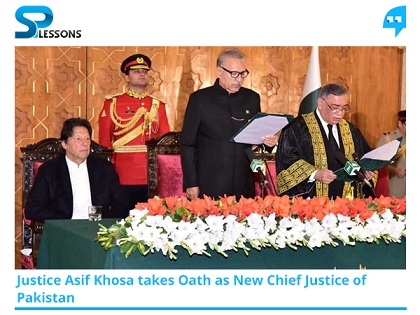 Introduction
Introduction
In present day custom, the Chief Justice has the stately obligation of overseeing the pledge of office of the President of Pakistan. The main Chief Justice was Sir Abdul Rashid. The present Chief Justice is Asif Saeed Khan Khosa; occupant since 18 January 2019. The article presents some important details about the Pakistan's newly appointed Chief Justice Asif Saeed Khan Khosa.
Asif Saeed Khosa was sworn in as chief justice of Pakistan’s Supreme Court on Friday, in a ceremony led by the country’s president, Dr. Arif Alvi. Khosa took the oath of office, pledging to do “right by all people, according to law, without fear or favor,” before an audience that included the prime minister, Imran Khan, and the chief of the armed forces, Qamar Javed Bajwa. Khosa is known as an experienced and respected judge, having presided over 55,000 cases in a career spanning over two decades.
 Key Points
Key Points
- The Chief Justice of Pakistan (initials as CJP) is the head of the court system of Pakistan (the judicature branch of government) and the chief judge of the Supreme Court of Pakistan.
- The Chief Justice is the senior most of 17 Senior Justices of the Supreme Court of Pakistan. From 1947 until 1960, the chief justice and senior justices were known as Federal Judge.
- The Chief Justice is the chief administrative officer of the country's court system and the highest judicial officer- ranking immediately above the Chief Justice of the Federal Shariat Court- and is responsible for supervising federal judicial policies, and conducting judicial business in the Supreme Court.
- Nomination for the appointment of the Chief Justice is made by Prime Minister of Pakistan, and final appointments are confirmed by the President of Pakistan.
- Presiding over the oral arguments before the court, the Chief Justice has significant agenda-setting power over meetings of the Supreme Court.
- In modern tradition[clarification needed], the Chief Justice has the ceremonial duty of administering the oath of office of the President of Pakistan.




